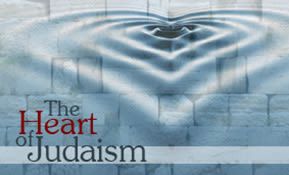
Crying for the Right Reason
On Tisha B'Av, we cry because Hashem has no home, His presence (Shechinah) is in exile, and we are far away from Him - NOT because of our personal suffering.

As long as we lack our rebuilt Beit HaMikdash, the Holy Temple in Jerusalem, we must feel genuine sorrow over its destruction. Tikkun Chatzot, or midnight lamentations, is our prescribed daily prayer for expressing our yearning for the Holy Temple.
During the three weeks leading up to Tisha B’Av (the ninth day of the Jewish month of Av) – the days in which the destruction took place – we increase our mourning. On Tisha B’Av, the grief reaches a fever pitch; we fast, sit on the floor, cry and recite lamentations.
The Gemara says that from the time of the destruction of the Holy Temple it is forbidden for a person to laugh with all his heart in this world. However, this does not mean that we should be sad, G-d forbid.
We must know how to serve Hashem at every point in time, and what the proper service is in a particular circumstance.
To paraphrase Ecclesiastes, at a time when one must be happy, he should be happy; at a time when one must cry, he should cry. Even when we cry, we must be careful to cry for the right reasons. Our tears should be tears of yearning for closeness to Hashem, and over the sins which keep us far from Him.
Unfortunately, a lot of people are taught to specifically mourn the destruction of the Holy Temple by crying over their own pain and suffering, which is inevitably caused by the current reality of exile. This is exactly wrong! Not only does such crying not fulfill the edict to cry and mourn over the destruction – it even causes more harsh suffering.
In fact, such crying is actually to specifically repeat the Sin of the Spies all over again – the sin for which both Holy Temples were destined to be destroyed, specifically on the same night of that fateful mistake. Although it was true that there were powerful giants in the Land of Israel etc., it was wrong to cry and complain that certainly they could not overcome them. How many times had G-d already promised the Jewish people, that although the enemy was strong, they would be delivered into their hands?
So too, with our suffering now. As I teach in The Garden of Gratitude, the suffering and bad in this world are not just good – it’s very good. But it is also hidden good. The key to revealing the light concealed in the suffering, is to believe in G-d, who ultimately sent that suffering for a good purpose. At the time of the test the purpose is hidden, or it would not be a test. But if we will just believe that it’s good even though we do not understand, everything will turn around for the best!
Therefore, it is critically important on Tisha B’Av in particular, to correct the sin of crying and complaining, and not continue it further. I repeat again: While it is true that crying is the order of the day – we are not crying over our suffering. We are crying because Hashem has no home, His presence (Shechinah) is in exile, and we are far away from Him. We are crying over the grandeur that should be the Jewish people, but because of our many sins, instead we are hated and persecuted. We cry at how much we lack daat (the knowledge of G-d) and especially, how much we want to fix ourselves and come closer to Him. The main point is to increase our desire to return to G-d by seeing how much we have lost because of our sins.
Similarly, sadness comes from the Sitra Achra – The Other Side, and it has no place in Judaism – not even on Tisha B’Av! On this day, Hashem expects us to mourn, and sit on the floor. Fine, that is what you want me to do, G-d? Sure. I’ll do it – and I’ll do it happily, since today, this is how Hashem wants me to serve Him. And I am happy to do whatever G-d commands me to do – including fast and sit on the floor.
The Talmud in Tractate Sukkah talks about Rabban Gamliel, Rabbi Elazar ben Azariah, Rabbi Yehoshua and Rabbi Akiva – four holy Tannaim – who walked down the road and heard the uproar of the Romans from a distance of hundreds of miles. There was so much joy and cheer in Rome that it could be heard as far away as the Land of Israel. Upon hearing the commotion, Rabban Gamliel, Rabbi Elazar and Rabbi Yehoshua cried, while Rabbi Akiva rejoiced and laughed.
“Why are you happy?” his friends asked.
“And why are you crying?” Rabbi Akiva answered.
“How can we not cry when those idol worshipers rejoice while our Holy Temple is burned?” they answered.
“That’s the very reason I’m so happy,” Rabbi Akiva replied.
“Please explain,” they said.
“If we see that transgressors of G-d’s will enjoy so much success and happiness – how much more joy and success will be relished by those who perform His will? Certainly, the Nation of Israel will ultimately merit tremendous joy – infinitely more than the joy the Romans are experiencing now,” Rabbi Akiva explained.
Rabbi Akiva was adamant to see only the good in every situation, including the aftermath of the Holy Temple’s destruction. He even saw the good in the fact that those who angered Hashem could enjoy happiness and success. He managed to extract the positive message from any situation. He realized – in the case of the Romans – that if those who anger Hashem receive so much revealed good, one can only imagine the blessings that will come, in due time, for those whose actions gratify Hashem.
We learn from Rabbi Akiva that although we are commanded to cry over the destruction of the Holy Temple, we should only do so during the midnight prayer (Tikkun Chatzot) and on Tisha B’Av. Those times aside, we should be strictly happy – always.
The Talmud relates that these four great sages continued walking and reached Mount Scopus, overlooking the site of the Holy Temple. They stood there and tore their clothing as a sign of mourning. (This law is still performed today: anyone who views the destroyed site of the Temple after not seeing it for thirty days must make a tear in his clothing, similar to a person mourning for a relative, Heaven forbid).
The sages saw a fox coming out of the place where the Holy of Holies had stood. They began to cry. But Rabbi Akiva, once again, rejoiced and laughed.
“Now what are you happy about?” they asked him.
“And what are you crying about again?” Rabbi Akiva retorted.
“How can we not cry?” they asked. “The place of which it is written ‘And the foreigner who nears it will be put to death’ now has foxes walking through it – and we shouldn’t cry? And you, what are you laughing about?”
Rabbi Akiva said to the sages: “As long as the prophecy of destruction was not fulfilled I was concerned that the prophecy of redemption would also not be fulfilled. But now that the destruction has indeed taken place, we can be sure that the prophecy of Zachariah will also be fulfilled, and there will be a great salvation and complete redemption, happiness and joy for the Jews. That is why I am happy and laughing.”
When Rabbi Akiva’s friends heard this, they exclaimed: “Akiva, you have comforted us! Akiva, you have comforted us!”
Rabbi Akiva shows us how a servant of G-d must look at the world. Everything must be in its proper measure and proper time. Certainly, Rabbi Akiva did not mourn the Temple any less than the other holy sages. But he knew when to cry and when to rejoice. When he did cry, it was not out of ingratitude, sadness, nor despair. His tears were tears of longing.
Let’s think for a moment. Do we miss the Holy Temple? If we really want to rebuild it, then why do we continue crying?
If we truly lamented the loss of our Holy Temple, it would have already been built. Our sages teach us that if the Holy Temple is not built in our generation, then it’s as if it were destroyed in our generation.
How can that be?
Hashem certainly doesn’t want the Holy Temple destroyed again, so He won’t rebuild it for us until we are worthy. To merit the Holy Temple, we must return to the path of truth and emuna – true belief in G-d. Every person must strive to do his or her part to avoid delaying the full redemption of our people and rebuilding of our Holy Temple. We can achieve this by strengthening our emuna and thanking Hashem for everything He does – the good and the seemingly otherwise.
We can cry justifiable tears because of our sins, which delay the rebuilding of the Holy Temple, or over the painful fact that the Jewish people and the world at large are shrouded in heavy spiritual darkness. But after one has finished crying, he must be happy and shift into a more constructive mode. Even on Tisha B’Av – when one laments for hours – he must be careful not to fall into the pit of sadness.
By being happy, a person not only strengthens his own emuna, but he also has the ability to help others strengthen themselves as well. In turn, he plays a role in hastening the rebuilding of the Holy Temple, speedily and in our days, amen!












Tell us what you think!
Thank you for your comment!
It will be published after approval by the Editor.